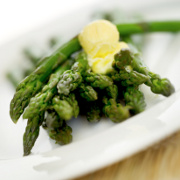 Photo: Getty Images
Photo: Getty Images
“Eating fat makes you fat” has been the modern American mantra for many diet enthusiasts. But buzz has been slowly building in the nutrition world about healthy fats. The new dogma says not all fats are not created equal. It’s no longer about low-fat versus high-fat; it’s all about the types of fat you are eating.
In general, fats are an important nutrient for the body. They help us slow down nutrient absorption so we feel fuller for longer. Fats work to steady our metabolism, regulate hormone levels and nourish our skin, hair and nails.
"Fat is not the problem," said Dr. Walter Willett, chairman of the department of nutrition at the Harvard School of Public Health in a December, 2010 Los Angeles Times article. "If Americans could eliminate sugary beverages, potatoes, white bread, pasta, white rice and sugary snacks, we would wipe out almost all the problems we have with weight and diabetes and other metabolic diseases."
In Dr. Mark Hyman’s book, UltraMetabolism, he breaks down fat into three categories: the good, the bad and the ugly.
“‘Good’ fats turn on the genes in your DNA that increase your metabolism, help you burn fat more quickly and become healthier,” Hyman wrote.
The king of the good fat category is omega-3 fats found in wild fish, flaxseeds, walnuts, pumpkin seeds and hemp seeds.
Second in line is the darling of the Mediterranean diet: monounsaturated fats—found mostly in olive oil, but also in hazelnuts, almonds and avocados.
Some saturated fats can also be part of the good fats club including meat and butter from free-range, organically fed, grass-fed and -finished animals. Another source of saturated fat is coconut oil, containing lauric acid, which helps boost immune function.
But you can take it one step further. Fats really matter when it comes to cooking.
“Saturated fats are actually the healthiest oils to cook with,” according to Mike Geary, certified nutrition specialist, personal trainer and author of The Truth About Six Pack Abs ebook. “They are much more stable and less inflammatory than polyunsaturated oils. This is why tropical oils such as palm and coconut oils—and even animal fats such as butter—are best for cooking.”
Hyman puts refined polyunsaturated vegetable oils into the bad fat category. These oils come from corn, soy, canola, safflower or some combination of vegetable oils. In small doses the unrefined versions of these oils may be okay, but they are not suitable for high heat cooking or baking.
“Processed polyunsaturated oils are the most inflammatory inside our bodies because of their high reactivity to heat and light,” Geary wrote in a recent press release. “This inflammation is what causes many of our internal problems such as heart disease, diabetes, and other degenerative diseases.”
The ugly fats are trans fats, which are partially hydrogenated fats found in vegetable shortening, some margarines, and many highly processed and/or fried foods. Hyman calls these fats toxic and says they have no place in the diet of any known species on the planet.
To avoid these fats read all product labels and avoid foods that have hydrogenated or partially hydrogenated oils.
Maybe the new mantra could be “eat the good and avoid the bad and the ugly fats.”
Suzanne Boothby is a Brooklyn-based wellness writer, certified health coach and co-founder of New York Family Wellness. Visit www.suzanneboothby.com to learn more.





Add a CommentComments
There are no comments yet. Be the first one and get the conversation started!